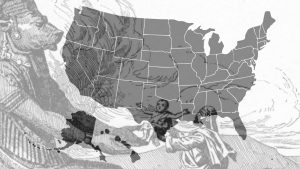A frequent argument made in defense of abortion is that, up until recently, it is Federal Law. With the overturning of Roe v. Wade, it is now the responsibility of the State legislature to define the legal parameters of abortion. In States where abortion is still legal, a concerning number of professing Christians would argue that, as the Law of the Land, it is wrong to pursue redefinition of its legal parameters. In other words, Christians should not vote to make it illegal.
The flaw with this argument is what will be addressed herein.
To use the “it’s the Law of the Land” as an argument in support of abortion, or any law that is immoral or sinful, cannot be justified as a Christian argument. That is, a Christian is neither six cubits; he set it up in the valley of Dura in the province of Babylon. obligated to honor nor prohibited from attempting to change the laws of the Land in which they live, if adherence to the laws in question requires a violation of the values, morals, and/or ethics of the Kingdom of God.
This fact is supported throughout both the Old and New Testament. But the best example of it is found in Daniel 3. We’ll just look at the key scriptures.
”Nebuchadnezzar the king made a statue of gold. Its height was sixty cubits and its width was
Then the herald proclaimed aloud, “To you it is commanded, O peoples, nations and people of all languages, that at the time that you hear the sound of the horn, the flute, the lyre, the trigon, the harp, the drum and all kinds of music, you must fall down and you must worship the statue of gold that Nebuchadnezzar the king has set up. And whoever does not fall down and worship will be thrown immediately into the midst of the furnace of blazing fire.”
Therefore at this time some astrologers came forward and they denounced the Jews. They responded and said to Nebuchadnezzar the king, “O king, may you live forever! However there are Judean men whom you have appointed over the affairs of the province of Babylon—Shadrach, Meshach, and Abednego—these men, O king, pay you no heed and were not serving your god, and the statue of gold that you set up they are not worshiping.”
Then Nebuchadnezzar said in rage and anger to bring in Shadrach, Meshach and Abednego; then they brought in these men before the king. Nebuchadnezzar answered and said to them, “Is it true, Shadrach, Meshach and Abednego, that you are not serving my god, and you are not worshiping the statue of gold that I have set up? Now if you are ready so that when you hear the sound of the horn, the flute, the lyre, the trigon, the harp and the drum and all kinds of music, you fall down and you worship the statue that I have made, that will be good. But if you do not worship it, immediately you will be thrown into the midst of the furnace of blazing fire, and who is the god who will rescue you from my hands?”
Shadrach, Meshach and Abednego answered and said to the king, Nebuchadnezzar, “We have no need on this matter to present a defense to you. If it is so, our God, whom we serve, is able to rescue us from the furnace of blazing fire. And from your hand, O king, let him rescue us. And if not, let it be known to you, O king, that we will not serve your gods, and the statue of gold that you have set up we will not worship.”“
Daniel 3:1, 4-6, 8-9, 12-18 LEB
There is more going on theologically beneath the surface of this story than meets the eye. To plumb the depths of it requires taking another dive into the historical-cultural context of the Ancient Near East.
Many biblical commentators claim that the statue of gold was crafted in the image of the king, that is, Nebuchadnezzar. But the text never says that. Other commentators and scholars, based on Babylonian religion and the emphasis of the furnace in the account, reckon that the statue of gold, while fashioned in the likeness of a king, was not Nebuchadnezzar. Rather, it is surmised that the statue of gold represented the Ancient Near East deity Mōlek.
The first biblical mention of Mōlek is in Leviticus:
“Then Yahweh spoke to Moses, saying, “And to the Israelites you shall say, ‘If there is anyone from the Israelites or from the alien who is dwelling in Israel, who gives any of his offspring to Molech, he must surely be put to death; the people of the land must stone him with stones. And I myself will set my face against that man, and I will cut him off from the midst of his people, because he has given some of his offspring to Molech, so that he makes my sanctuary unclean and profane my holy name. And if the people of the land ever shut their eyes from that man at his giving some of his offspring to Molech, not putting him to death, then I myself will set my face against that man and against his clan, and I will cut him off and all those from the midst of their people who prostitute after Molech.”
Leviticus 20:1-5 LEB
Who or what Mōlek was—that is, the historicity of the name identifying a deity—has been a point of debate among scholars. However, the recent works of John Day and George Heider have put that debate to rest.
The question has now shifted as to whether m-l-k (Mōlek) was a unique deity or a different name used for another. The reason for this question arises from the fact that the Ancient Near Eastern cult of child sacrifice associated with m-l-k was also associated with Baal.
Ancient Hebrew had no consonants. Because of that certain words, such as Mōlek and Mālik (King), were spelled the same: m-l-k. With such a close relation between Mōlek and Malik, there is a postulation that Mōlek was the deity/King of the Underworld or realm of the Dead. If this was indeed the case, child sacrifices would have been offered to appease him and garner his favor.
However, that does not quite answer the question of the association of Baal with child sacrifice.
Anyone familiar with the Old Testament knows that Baal was the chief rival of Yahweh as it pertained to Israelite loyalty. So much so, that Baal Zebul (Beelzebub) was a name commonly associated in the New Testament with the Devil or Satan. It is an odd coincidence that in Second Temple Judaism’s belief system (that of Jesus’ and the apostle’s day), the Devil or Satan was cast as King of the Underworld or “Lord of the Dead.” Perhaps that is what the book of Jude is inferring when it references the Devil arguing with Michael over the body of Moses: the Devil, as Lord of the Underworld, had a legitimate claim on Moses’ dead body.
What then is the connection between Mōlek, Baal, the Devil, and the King (m-l-k) of the Dead? And what does it have to do with Abortion?
M-L-K, when it is translated as Malik, means “king”. It is interesting that, no matter which derivation associated with Mōlek is chosen, they all come from the same root and have the same meaning, “king”. The deity name Baal means “lord” or “owner”. Could it be that Baal and m-l-k are referencing the same deity but using different names?
Hebrew has no definite article. When Leviticus 20:2 says “who gives any of his offspring to Mōlek”, the word for Mōlek would appear as m-l-k. If Mōlek and Mālik both mean “king”, and m-l-k, when translated as Mōlek is a title, then m-l-k would mean “King” as the deity’s title. And since Hebrew has no definite article, ”the“, as in “the King”, would be inferred in Hebrew by the title but inserted when translated into English. Both Day and Heider accept the identification of Mōlek with Mālik.
That Mālik and Mōlek are one and the same is clear but what about the associations with Baal and the King of the Underworld? The Ancient Near Eastern cult of child sacrifice to, as we now understand it, “the King” (m-l-k) makes the connection to Baal evident. Victorious Baal was elevated to the status of “King of the Gods” in Ugaritic and Canaanite religion. This excerpt from the Dictionary of Dieties and Demons in the Bible sheds light on that.
“Far more productive are the mythological texts from Ras Shamra ca. 1350 BCE, which contain over 500 references to Baal. They help us to delineate the particular province of the god. The myths tell how he obtained royal rule and reigns as king (KTU 1.2 iv:32; 1.4 vii:49–50). He is called sovereign (‘judge’, ṯpṭ, a title more frequently applied to the god Yammu) and king (KTU 1.3 v:32; 1.4 iv:43–44).
Several times his kingdom, his royal throne and his sovereignty are mentioned (KTU 1.1 iv:24–25; 1.2 iv:10; 1.3 iv:2–3; 1.4 vii:44; 1.6 v:5–6; vi:34–35; 1.10:13–14). His elevated position shows itself in his power over clouds, storms and lightning, and manifests itself in his thundering voice (KTU 1.4 v:8–9; vii:29, 31; 1.5 v:7; 1.101:3–4). As the god of wind and weather Baal dispenses dew, rain, and snow (KTU 1.3 ii: 39–41; 1.4 v:6–7; 1.5 v:8; 1.16 iii:5–7; 1.101:7) and the attendant fertility of the soil (KTU 1.3 ii:39; 1.6 iii:6–7, 12–13 [note the metaphor of ‘oil and honey’, for which see also the Hebrew phrase ‘a land flowing with milk and honey’ in Exod 3:8, 17; Lev 20:24; Deut 26:9; cf. Amos 9:13; Ps 65:12]; KTU 1.4 vii:50–51).
Baal’s rule guarantees the annual return of the vegetation; as the god disappears in the underworld and returns in the autumn, so the vegetation dies and resuscitates with him. Being the major one among the gods, or rather perceived as such, Baal was naturally a king to his Ugaritic devotees. Yet kingship is not Baal’s sole characteristic; it is merely the way he is extolled.”
-W. Herrmann, “Baal,” ed. Karel van der Toorn, Bob Becking, and Pieter W. van der Horst, Dictionary of Deities and Demons in the Bible
From this we see that Baal was considered as king of the gods among Ancient Near Eastern peoples contemporary with biblical Israel. It is also of note that Baal is the one who guaranteed the harvest. It stands to reason that the associated child sacrifices were made to Baal to ensure a successful or abundant crop/harvest. The sacrifice of one, or a few, would be to the benefit of the whole village, tribe, community, or, in the case of Daniel 3, the Babylonian Empire. Food for thought, given our current predicament as a nation.
Now, to bridge the connection between being king of the gods and lord of the underworld, let us consider this quote from Dr. Michael Heiser’s book The Unseen Realm:
“The nachash was cursed to crawl on its belly, imagery that conveyed being cast down (Ezek 28:8, 17; Isa 14:11–12, 15) to the ground. In Ezekiel 28 and Isaiah 14, we saw the villain cast down to the ʾerets, a term that refers literally to the dirt and metaphorically to the underworld (Ezek 28:17; Isa 14:9, 11–12, 15). The curse also had him “eating dirt,” clearly a metaphorical reference, since snakes don’t really eat dirt as food for nutrition. It isn’t part of the “natural snake diet.” The point being made by the curse is that the nachash, who wanted to be “most high,” will be “most low” instead—cast away from God and the council to earth, and even under the earth. In the underworld, the nachash is even lower than the beasts of the field. He is hidden from view and from life in God’s world. His domain is death.”
The Serpent of Eden, thought by most to be the Devil or Satan himself, became King of the Underworld or Lord of the Dead after the Fall. When considered next to what we’ve learned about Mālik, Mōlek, and Baal Zebul (Beelzebub), “King of the Underworld” or “Lord of the Dead” appears to be another title applied to the same deity. In other words, same guy, different mask. Which is the reason why the Ancient Near Eastern cult of child sacrifice was associated with both m-l-k and Baal.
With this in mind, it is evident as to why the boys (Shadrach, Meshach, and Abednego) refused to obey the law of the Land. King Nebuchadnezzar had erected a statue of gold in honor of “the King” (m-l-k) and was attempting to reinstitute the cult practice of child sacrifice to m-l-k in the kingdom of Babylon.
The emphasis of the writer of Daniel makes it clear that anything save for refusal to obey this law was detestable in the eyes of Yahweh. The cult practice of child sacrifice to m-l-k was something to which Yahweh was completely opposed. An opposition that was expected to be shared by those loyal to him, even against the edicts and decrees of kings and rulers.
It is clear then that the argument for abortion, that “it’s the Law of the Land”, cannot withstand the weight of the biblical witness to which it appeals. It has never been a biblical or Christian practice to honor the laws of a Land that are antithetical to the Kingdom of God. And in the case of the legalization of abortion, a law that is satanic in both nature and origin.





